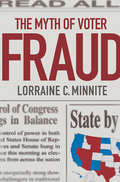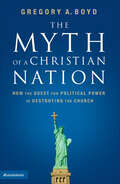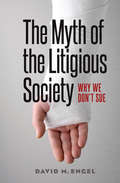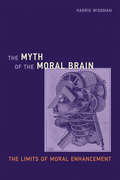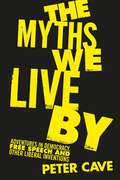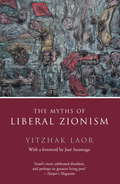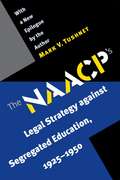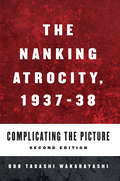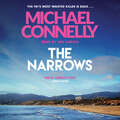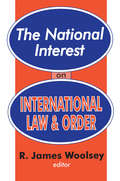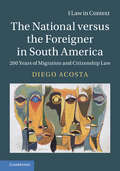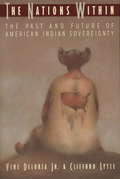- Table View
- List View
The Myth of Voter Fraud
by Lorraine C. MinniteAllegations that widespread voter fraud is threatening to the integrity of American elections and American democracy itself have intensified since the disputed 2000 presidential election. The claim that elections are being stolen by illegal immigrants and unscrupulous voter registration activists and vote buyers has been used to persuade the public that voter malfeasance is of greater concern than structural inequities in the ways votes are gathered and tallied, justifying ever tighter restrictions on access to the polls. Yet, that claim is a myth. In The Myth of Voter Fraud, Lorraine C. Minnite presents the results of her meticulous search for evidence of voter fraud. She concludes that while voting irregularities produced by the fragmented and complex nature of the electoral process in the United States are common, incidents of deliberate voter fraud are actually quite rare. Based on painstaking research aggregating and sifting through data from a variety of sources, including public records requests to all fifty state governments and the U.S. Justice Department, Minnite contends that voter fraud is in reality a politically constructed myth intended to further complicate the voting process and reduce voter turnout. She refutes several high-profile charges of alleged voter fraud, such as the assertion that eight of the 9/11 hijackers were registered to vote, and makes the question of voter fraud more precise by distinguishing fraud from the manifold ways in which electoral democracy can be distorted. Effectively disentangling misunderstandings and deliberate distortions from reality, The Myth of Voter Fraud provides rigorous empirical evidence for those fighting to make the electoral process more efficient, more equitable, and more democratic.
The Myth of a Christian Nation: How the Quest for Political Power Is Destroying the Church
by Gregory A. BoydThe church was established to serve the world with Christ-like love, not to rule the world. It is called to look like a corporate Jesus, dying on the cross for those who crucified him, not a religious version of Caesar. It is called to manifest the kingdom of the cross in contrast to the kingdom of the sword. Whenever the church has succeeded in gaining what most American evangelicals are now trying to get – political power – it has been disastrous both for the church and the culture. Whenever the church picks up the sword, it lays down the cross. The present activity of the religious right is destroying the heart and soul of the evangelical church and destroying its unique witness to the world. The church is to have a political voice, but we are to have it the way Jesus had it: by manifesting an alternative to the political, “power over,” way of doing life. We are to transform the world by being willing to suffer for others – exercising “power under,” not by getting our way in society – exercising “power over.”
The Myth of the Imperial Judiciary: Why the Right is Wrong About the Courts
by Mark KozlowskiAnalysis of judicial activity.
The Myth of the Imperial Judiciary: Why the Right is Wrong about the Courts
by Mark KozlowskiFew institutions have become as ferociously fought over in democratic politics as the courts. While political criticism of judges in this country goes back to its inception, today’s intensely ideological assault is nearly unprecedented.Spend any amount of time among the writings of contemporary right-wing critics of judicial power, and you are virtually assured of seeing repeated complaints about the “imperial judiciary.” American conservatives contend not only that judicial power has expanded dangerously in recent decades, but that liberal judges now willfully write their policy preferences into law. They raise alarms that American courts possess a degree of power incompatible with the functioning of a democratic polity. The Myth of the Imperial Judiciary explores the anti-judicial ideological trend of the American right, refuting these claims and taking a realistic look at the role of courts in our democracy to show that conservatives have a highly unrealistic conception of their power. Kozlowski first assesses the validity of the conservative view of the Founders’ intent, arguing that courts have played an assertive role in our politics since their establishment. He then considers contemporary judicial powers to show that conservatives have greatly overstated the extent to which the expansion of rights which has occurred has worked solely to the benefit of liberals.Kozlowski reveals the ways in which the claims of those on the right are often either unsupported or simply wrong. He concludes that American courts, far from imperiling our democracy or our moral fabric, stand as a bulwark against the abuse of legislative power, acting forcefully, as they have always done, to give meaning to constitutional promises.
The Myth of the Litigious Society: Why We Don't Sue
by David M. EngelWhy do Americans seem to sue at the slightest provocation? The answer may surprise you: we don’t! For every “Whiplash Charlie” who sees a car accident as a chance to make millions, for every McDonald’s customer to pursue a claim over a too-hot cup of coffee, many more Americans suffer injuries but make no claims against those responsible or their insurance companies. The question is not why Americans sue but why we don’t sue more often, and the answer can be found in how we think about injury and personal responsibility. With this book, David M. Engel demolishes the myth that America is a litigious society. The sobering reality is that the vast majority of injury victims—more than nine out of ten—rely on their own resources, family and friends, and government programs to cover their losses. When real people experience serious injuries, they don’t respond as rational actors. Trauma and pain disrupt their thoughts, and potential claims are discouraged by negative stereotypes that pervade American television and popular culture. (Think Saul Goodman in Breaking Bad, who keeps a box of neck braces in his office to help clients exaggerate their injuries.) Cultural norms make preventable injuries appear inevitable—or the victim’s fault. We’re taught to accept setbacks stoically and not blame someone else. But this tendency to “lump it” doesn’t just hurt the victims; it hurts us all. As politicians continue to push reforms that miss the real problem, we risk losing these claims as a way to quickly identify unsafe products and practices. Because injuries disproportionately fall on people with fewer resources, the existing framework creates a social underclass whose needs must be met by government programs all citizens shoulder while shielding those who cause the harm. It’s time for America to have a more responsible, blame-free discussion about injuries and the law. With The Myth of the Litigious Society, Engel takes readers clearly and powerfully through what we really know about injury victims and concludes with recommendations for how we might improve the situation.
The Myth of the Moral Brain: The Limits of Moral Enhancement (Basic Bioethics)
by Harris WisemanAn argument that moral functioning is immeasurably complex, mediated by biology but not determined by it.Throughout history, humanity has been seen as being in need of improvement, most pressingly in need of moral improvement. Today, in what has been called the beginnings of “the golden age of neuroscience,” laboratory findings claim to offer insights into how the brain “does” morality, even suggesting that it is possible to make people more moral by manipulating their biology. Can “moral bioenhancement”—using technological or pharmaceutical means to boost the morally desirable and remove the morally problematic—bring about a morally improved humanity? In The Myth of the Moral Brain, Harris Wiseman argues that moral functioning is immeasurably complex, mediated by biology but not determined by it. Morality cannot be engineered; there is no such thing as a “moral brain.”Wiseman takes a distinctively interdisciplinary approach, drawing on insights from philosophy, biology, theology, and clinical psychology. He considers philosophical rationales for moral enhancement, and the practical realities they come up against; recent empirical work, including studies of the cognitive and behavioral effects of oxytocin, serotonin, and dopamine; and traditional moral education, in particular the influence of religious thought, belief, and practice. Arguing that morality involves many interacting elements, Wiseman proposes an integrated bio-psycho-social approach to the consideration of moral enhancement. Such an approach would show that, by virtue of their sheer numbers, social and environmental factors are more important in shaping moral functioning than the neurobiological factors with which they are interwoven.
The Myth of the Robber Barons: A New Look at the Rise of Big Business in America (5th edition)
by Burton W. FolsomA new look at the Rise of Big Businesses in America.This book is a new look at entrepreneurs and government and the role of both in the rise of big business. It is a study of four industries--steamships, railroads, steel, and oil--and of the people who pushed the United States into world leadership in these industries.
The Myths We Live By: A Contrarian's Guide to Democracy, Free Speech and Other Liberal Fictions
by Peter CaveIn this witty and mischievous book, philosopher Peter Cave dissects the most controversial disputes today and uses philosophical argument to reveal that many issues are less straightforward than we'd like to believe. Leaving no sacred cow standing, Cave uses ingenious stories and examples to challenge our most strongly held assumptions. Is democracy inherently a good thing? What is the basis of so-called human rights? Is discrimination always bad? Are we morally obliged to accept refugees? In an age of identity politics and so-called "fake news," this book is an essential resource for reinvigorating genuine public debate —and an entertaining challenge to accepted wisdom.
The Myths of Liberal Zionism
by Yitzhak LaorYitzhak Laor is one of Israel's most prominent dissidents and poets, a latter-day Spinoza who helps keep alive the critical tradition within Jewish culture. In this work he fearlessly dissects the complex attitudes of Western European liberal Left intellectuals toward Israel, Zionism and the "Israeli peace camp." He argues that through a prism of famous writers like Amos Oz, David Grossman and A.B. Yehoshua, the peace camp has now adopted the European vision of "new Zionism," promoting the fierce Israeli desire to be accepted as part of the West and taking advantage of growing Islamophobia across Europe.The backdrop to this uneasy relationship is the ever-present shadow of the Holocaust. Laor is merciless as he strips bare the hypocrisies and unarticulated fantasies that lie beneath the love-affair between "liberal Zionists" and their European supporters.
The NAACP's Legal Strategy against Segregated Education, 1925-1950
by Mark V. TushnetThe NAACP's fight against segregated education--the first public interest litigation campaign--culminated in the 1954 Brown decision. While touching on the general social, political, and economic climate in which the NAACP acted, Mark V. Tushnet emphasizes the internal workings of the organization as revealed in its own documents. He argues that the dedication and the political and legal skills of staff members such as Walter White, Charles Hamilton Houston, and Thurgood Marshall were responsible for the ultimate success of public interest law. This edition contains a new epilogue by the author that addresses general questions of litigation strategy, the persistent question of whether the Brown decision mattered, and the legacy of Brown through the Burger and Rehnquist courts.
The NEC4 Engineering and Construction Contract: A Commentary
by Brian EgglestonThe authoritative guide to the NEC4 Engineering and Construction Contract The New Engineering Contract (NEC) is one of the leading standard forms of contract for major construction and infrastructure projects. The latest edition of the contract (NEC4) is now a suite of contracts widely used in the UK, Australia, Hong Kong, South Africa, Ireland, and New Zealand. This timely and important book provides a detailed commentary on the latest edition of the main NEC4 Engineering and Construction Contract (NEC4 ECC) form. It explains how the contract is intended to operate and examines each clause to consider its application and legal interpretation. It also draws upon the author's highly successful third edition of the book covering the previous contract. It identifies and comments on the changes between the current and previous version of the form. After a brief introduction to the new edition of the form, The NEC4 Engineering and Construction Contract offers in-depth chapters covering everything from main options and secondary option clauses to risk assurances and NEC 4 family contracts. In between, readers will learn about general core clauses, the obligations and responsibilities of the contractor, testing and defects, payments, compensation events, and much more. Covers the latest version of the NEC Engineering and Construction Contract, the leading standard form contract for major construction projects Examines the new contract clause by clause and compares it with the previous edition Previous editions were widely acknowledged as detailed and fair analyses of the NEC contracts Written by a highly regarded contracts commentator, experienced arbitrator, and adjudicator The NEC4 Engineering and Construction Contract: A Commentary is an excellent book for construction industry professionals working for clients, employers, main contractors, project managers, subcontractors, and specialist contractors.
The NSA Report: Liberty and Security in a Changing World
by Cass R. Sunstein Richard A. Clarke Geoffrey R. Stone Peter Swire Michael J. Morell President's Review Group on Intelligence and Communications Technologies, TheThe official report that has shaped the international debate about NSA surveillance"We cannot discount the risk, in light of the lessons of our own history, that at some point in the future, high-level government officials will decide that this massive database of extraordinarily sensitive private information is there for the plucking. Americans must never make the mistake of wholly 'trusting' our public officials."—The NSA ReportThis is the official report that is helping shape the international debate about the unprecedented surveillance activities of the National Security Agency. Commissioned by President Obama following disclosures by former NSA contractor Edward J. Snowden, and written by a preeminent group of intelligence and legal experts, the report examines the extent of NSA programs and calls for dozens of urgent and practical reforms. The result is a blueprint showing how the government can reaffirm its commitment to privacy and civil liberties—without compromising national security.
The NYPD Tapes: A Shocking Story of Cops, Cover-Ups, and Courage
by Graham A. RaymanFrom the Pulitzer Prize–nominated reporter, an “account of a modern-day Serpico’s battle with an all-powerful police department . . . somber and inspiring” (Publishers Weekly).In May 2010, NYPD officer Adrian Schoolcraft made national headlines when he released a series of secretly recorded audio tapes exposing corruption and abuse at the highest levels of the police department. But, according to a lawsuit filed by Schoolcraft against the City of New York, instead of admitting mistakes and pledging reform Schoolcraft’s superiors forced him into a mental hospital in an effort to discredit the evidence.In The NYPD Tapes, the reporter who first broke the Schoolcraft story brings his ongoing saga up to date, revealing the rampant abuses that continue in the NYPD today, including warrantless surveillance and systemic harassment. Through this lens, he tells the broader tale of how American law enforcement has for the past thirty years been distorted by a ruthless quest for numbers, in the form of CompStat, the vaunted data-driven accountability system first championed by New York police chief William Bratton and since implemented in police departments across the country. Forced to produce certain crime stats each quarter or face discipline, cops in New York and everywhere else fudged the numbers, robbing actual crime victims of justice and sweeping countless innocents into the police net. Rayman paints a terrifying picture of a system gone wild, and the pitiless fate of the whistleblower who tried to stop it.“A tale of crime prevention turned upside down in the Bloomberg era. Rayman has invented a new genre: the police misprocedural.” —Tom Robbins, New York Times–bestselling author
The Naked Android: Synthetic Socialness and the Human Gaze (Chapman & Hall/CRC Artificial Intelligence and Robotics Series)
by Julie CarpenterThe Naked Android: Synthetic Socialness and the Human Gaze illuminates the connection between the stories people tell, their expectations of what a robot is, and how these beliefs and values manifest in how real robots are designed and used.The introduction of the “human gaze” articulates how peoples’ expectations and perceptions about robots are ultimately based on deeply personal cultural interpretations of what is artificial or human and what problems social robots should –or should not –solve. The Naked Android clarifies how human qualities like understanding and desire are designed into robots as mediums as well as projected onto them by the people who live with them.By investigating the fluidity of identities across human culture and social robotics, this book unpacks the contextual complexities of their interactions and mutual influences. Using ethnographic methods including in-depth interviews with a variety of stakeholders, each chapter explores how people are designing social robots, the experience of living with robots, and people whose jobs it is to dream about a future integrated with robots.Key Features: Introduces the concept of the “human gaze” (and the “robot gaze”) as means of understanding how people live with robots. Each chapter includes in-depth interviews with people who make, live with, or create art about robots. Using ethnographic methods, paints a vivid description of the interconnecting influences of science fiction, human imagination, and real technology.
The Naked Society
by Rick Perlstein Vance PackardOriginally published in 1964, The Naked Society was the first book on the threats to privacy posed by new technologies such as modern surveillance techniques and methods for influencing human behavior. This all new edition of the book features an introduction by noted historian Rick Perlstein.
The Nanjing Massacre and Sino-Japanese Relations: Examining the Japanese 'Illusion' School
by Zhaoqi ChengBased on extensive research on the International Military Tribunal for the Far East, this book closely examines the claims and controversy surrounding the ‘Nanjing Massacre’, a period of murder in 1937-1938 committed by Japanese troops against the residents of Nanjing (Nanking), after the capture of the then capital of the Republic of China, during the Second Sino-Japanese War. Focusing on weighing up arguments denying Nanjing Massacre, this book considers the Japanese ‘Illusion’ school of thought which contests the truth of the Nanjing Massacre claims, including the death toll and the scale of the violence. The Nanjing Massacre remains a controversial issue in Sino-Japanese relations, despite the normalization of bilateral relations, and this book goes to great lengths to examine the events through comparative narratives, investigating different perspectives and contributings to the debate from the extensive research of the Tokyo Trial Research Centre at Shanghai, as well as volumes of Chinese and Japanese historical documents.
The Nanking Atrocity, 1937-1938: Complicating the Picture
by Bob Tadashi WakabayashiFirst published in 2007, The Nanking Atrocity remains an essential resource for understanding the massacre committed by Japanese soldiers in Nanking, China during the winter of 1937-38. Through a series of deeply considered and empirically rigorous essays, it provides a far more complex and nuanced perspective than that found in works like Iris Chang's bestselling The Rape of Nanking. It systematically reveals the flaws and exaggerations in Chang's book while deflating the self-exculpatory narratives that persist in Japan even today. This second edition includes an extensive new introduction by the editor reflecting on the historiographical developments of the last decade, in advance of the 80th anniversary of the massacre.
The Nanotechnology Challenge: Creating Legal Institutions for Uncertain Risks
by David A. DanaNanotechnology is the wave of the future, and has already been incorporated into everything from toothpaste to socks to military equipment. The safety of nanotechnology for human health and the environment is a great unknown, however, and no legal system in the world has yet devised a way to reasonably address the uncertain risks of nanotechnology. To do so will require creating new legal institutions. This volume of essays by leading law scholars and social and physical scientists offers a range of views as to how such institutions should be formed. It is essential reading for anyone who may wonder how we can continue to innovate technologically in a way that both delivers the benefits and sustains human health and the environment.
The Narrows (Harry Bosch Series #10)
by Michael ConnellyHe's back . . . Private investigator Harry Bosch confronts a villain who's long been in hiding - a fiend known as The Poet. Former FBI agent Rachel Walling is working a dead-end stint in South Dakota when she gets the call she's been dreading for four years. The Poet is back. And he has not forgotten Rachel. He has a special present for her. Harry Bosch is adjusting to life in Las Vegas as a private investigator and a new father. He gets a call, too, from the widow of a friend who died recently. Previously in his FBI career, the friend worked on the famous case tracking the killer known as The Poet. This fact alone makes some of the elements of his death doubly suspicious. And Harry Bosch is heading straight into the path of the most ruthless and inventive murderer he has ever encountered. . .
The Narrows (Harry Bosch Series #10)
by Michael ConnellyFormer FBI agent Rachel Walling is working a dead-end stint in South Dakota when she gets the call she's been dreading for four years. The Poet is back. And he has not forgotten Rachel. He has a special present for her. Harry Bosch is adjusting to life in Las Vegas as a private investigator and as a new father. He gets a call, too, from the widow of a friend who died recently. Previously in his FBI career, the friend worked on the famous case tracking the killer known as The Poet. This fact alone makes some of the elements of his death doubly suspicious. And Harry Bosch is heading straight into the path of the most ruthless and inventive murderer he has ever encountered...Read by David Soul(p) 2004 Orion Publishing Group
The Natchez Burning Trilogy: A Penn Cage Collection Featuring: Natchez Burning, The Bone Tree, and Mississippi Blood (Penn Cage)
by Greg Iles“A superb entertainment that is a work of power, distinction and high seriousness.” – Washington PostFrom #1 New York Times bestselling author Greg Iles come the widely acclaimed Natchez Burning trilogy, featuring Penn CageNatchez BurningRaised in Natchez, Mississippi, Penn Cage learned all he knows from his father, Dr. Tom Cage. But now Tom has been accused of murdering the Black nurse with whom he worked in the 1960s and Penn is determined to exonerate him. The quest for answers leads down a trail of corruption and brutality that places Penn’s family squarely in the crosshairs of the Double Eagles, a vicious offshoot of the KKK controlled by some of the state’s most powerful men. Penn ultimately must acknowledge that secrets from his father’s past have put the Cage family in great jeopardy. The Bone TreePenn Cage’s family is in crisis, has inadvertently started a war with an offshoot of the KKK called the Double Eagles, and his fiancée, journalist Caitlin Masters, is chasing the biggest—and most dangerous— story of her career. The only path out of this chaos is taking on the powerful men behind the Double Eagles, who are hiding a secret legacy darker than anything Penn can imagine. All roads lead to the Bone Tree, a legendary killing site that conceals far more than the remains of the forgotten—and where the shadow of personal tragedy threatens all Penn holds dearest. Mississippi BloodPenn Cage is shattered by grief and dreaming of vengeance. The woman he loves is gone, and his father Dr. Tom Cage is about to be tried for murder. When Tom stubbornly refuses to speak in his own defense, Penn joins forces with Serenity Butler, a famous young Black author who has come to Natchez to write about his father's case. Together, Penn and Serenity battle to discover the secret history of the Cage family and the South itself, a desperate move that risks the only thing they have left to gamble: their lives.
The Nation That Never Was: Reconstructing America's Story
by Kermit Roosevelt III&“Persuasively argues that we must liberate ourselves from our sentimentalized attachment to the &‘Founders&’ and even the Declaration of Independence&” --Sanford Levinson, author of Our Undemocratic Constitution There&’s a common story we tell about America: that our fundamental values as a country were stated in the Declaration of Independence, fought for in the Revolution, and made law in the Constitution. But, with the country increasingly divided, this story isn&’t working for us anymore—what&’s more, it&’s not even true. As Kermit Roosevelt argues in this eye-opening reinterpretation of the American story, our fundamental values, particularly equality, are not part of the vision of the Founders. Instead, they were stated in Lincoln&’s Gettysburg Address and were the hope of Reconstruction, when it was possible to envision the emergence of the nation committed to liberty and equality. We face a dilemma these days. We want to be honest about our history and the racism and oppression that Americans have both inflicted and endured. But we want to be proud of our country, too. In The Nation That Never Was, Roosevelt shows how we can do both those things by realizing we&’re not the country we thought we were. Reconstruction, Roosevelt argues, was not a fulfillment of the ideals of the Founding but rather a repudiation: we modern Americans are not the heirs of the Founders but of the people who overthrew and destroyed that political order. This alternate understanding of American identity opens the door to a new understanding of ourselves and our story, and ultimately to a better America. &“An inspiring reexamination of America's past.&” —Publishers Weekly &“Compelling and well worth consideration.&” —Kirkus Reviews, starred review
The National Interest on International Law and Order
by R. James WoolseyInternational law and the nature of the global order is regularly examined and debated among specialists. This volume brings together in one place twenty-four articles addressing these subjects, written by some of America's leading academics, lawyers, and policymakers, and originally published in The National Interest, a leading realist journal of international affairs.Prominent jurists, lawyers, and practitioners debate the role that international law should play in the formulation of policy in the first section, and whether 'international law' really exists. Authors explore such questions as the enforceable norms of global behavior, and if American foreign policy should conform to such regulations. A second section looks at the viability and utility of international institutions in advancing U.S. interests. Included are debates over the role and purpose of the United Nations and the International Criminal Court. A third Section deals with the intersection of law enforcement and foreign policy. It explores such questions as whether primary responsibility for combating global terrorism and the international drug trade should be vested with law enforcement agencies or whether it should fall under the purview of foreign policy.The final portion of the book is devoted to the question of human rights, particularly the tripartite debate between Robin Fox, Francis Fukuyama, and William F. Schulz over the nature and origins of human rights. Among the questions considered are whether human rights are an outgrowth of natural law, or are natural imperatives at odds with protecting individual dignities and freedoms. Is there a universal standard of rights, or are human rights norms derived from majority consensus?The list of distinguished contributors to this volume include John Bolton, Robert Bork, Lee Casey, Douglas Feith, Owen Harries, Senator Jesse Helms, Alan Keyes, Irving Kristol, Joseph Nye, Jeremy Rabkin, David Rivkin, Alfred P. Rubin, and Abrahama Sofaer. This volume will be of interest to legal scholars, political scientists, and students of diplomacy and international relations.
The National versus the Foreigner in South America: 200 Years of Migration and Citizenship Law (Law in Context )
by Diego AcostaSince the turn of the century, South American governments and regional organisations have adopted the world's most open discourse on migration and citizenship. At a time when restrictive choices were becoming increasingly predominant around the world, South American policymakers presented their discourse as being both an innovative and exceptional 'new paradigm' and part of a morally superior, avant-garde path in policymaking. <P><P>This book provides a critical examination of the South American legal framework through a historical and comparative analysis. Diego Acosta uses this analysis to assess whether the laws are truly innovative and exceptional, as well as evaluating their feasibility, strengths and weaknesses. By analysing the legal construction of the national and the foreigner in ten South American countries during the last two centuries, he demonstrates how different citizenship and migration laws have functioned, as well as showing why states have opted for certain regulation choices, and the consequence of these choices for state- and nation-building in the continent. An invaluable insight for anyone interested in global migration and citizenship discussions.<P> Offers in depth coverage and critical analysis of the present legal regulations of migration and citizenship law.<P> Discusses the extremely interesting principles behind South American migration and citizenship laws, including universal citizenship, the non-criminalisation of irregular migration, and the right to migrate as fundamental.<P> Features analysis of ten South American countries across two centuries which uncovers wider transnational trends and legal mechanisms.<P>
The Nations Within
by Vine DeloriaThe message of The Nations Within is an urgent on, and should be read by anyone concerned with American Indian affairs today. "Those of us who try to understand what is happening in North American Indian communities have learned to see Vine Delora, Jr., both as an influential actor in the ongoing drama and also as its most knowledgeable interpreter. This new book on Indian self-rule is the most informative that I have seen in my own half-century of reading. Deloria and his co-author focus on John Collier's struggle with both the U.S. Congress and the Indian tribes to develop a New Deal for Indians fifty years ago. It is a blow-by-blow historical account, perhaps unique in the literature, which may be the only way to show the full complexity of American Indian relations with federal and state governments. This makes it possible in two brilliant concluding chapters to clarify Indian points of view and to build onto initiatives that Indians have already taken to suggest which of these might be most useful for them to pursue. The unheeded message has been clear throughout history, but now we see how--if we let Indians do it their way--they might more quickly than we have imagined rebuild their communities."--Sol Tax, Professor Emeritus of Anthropology, University of Chicago
